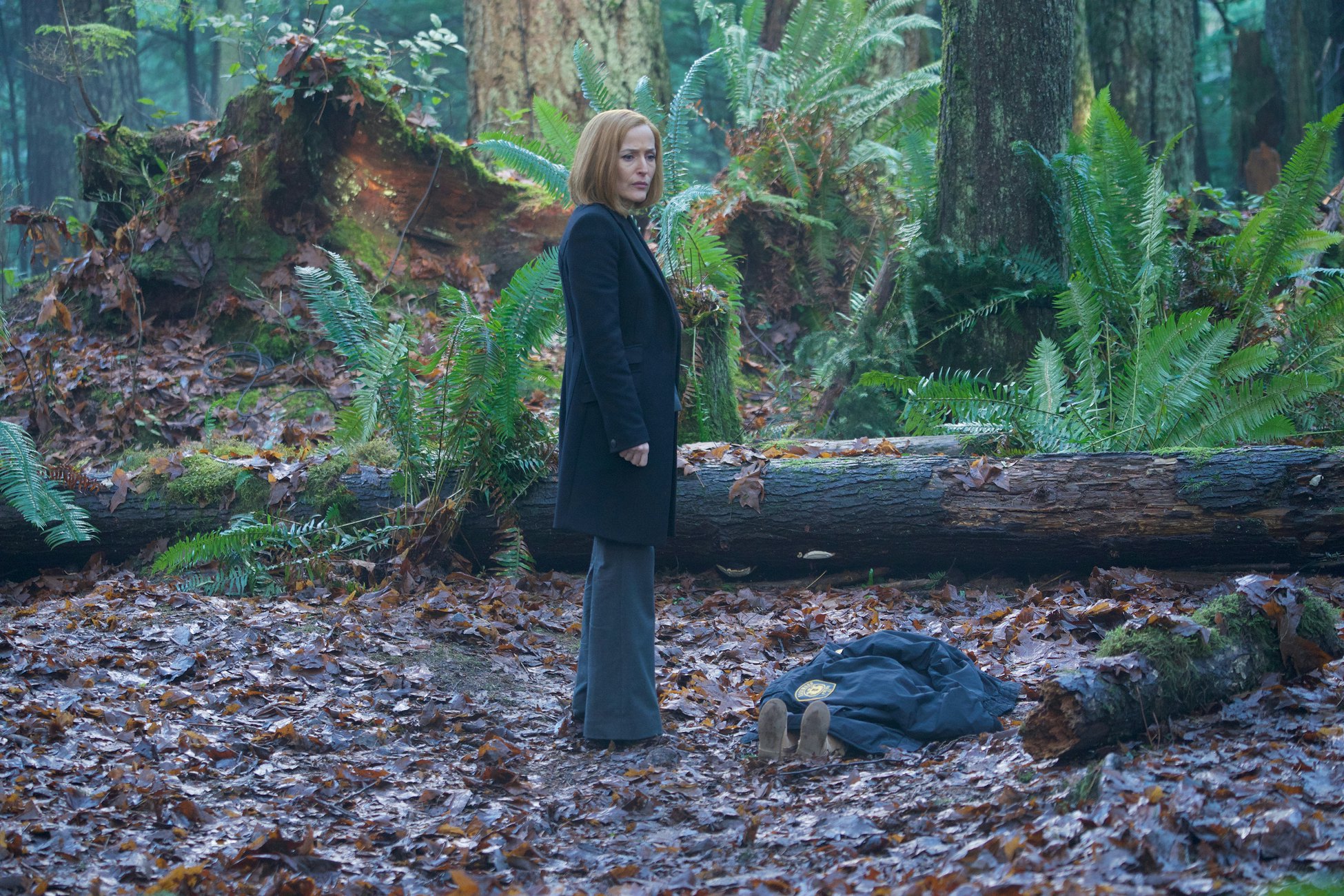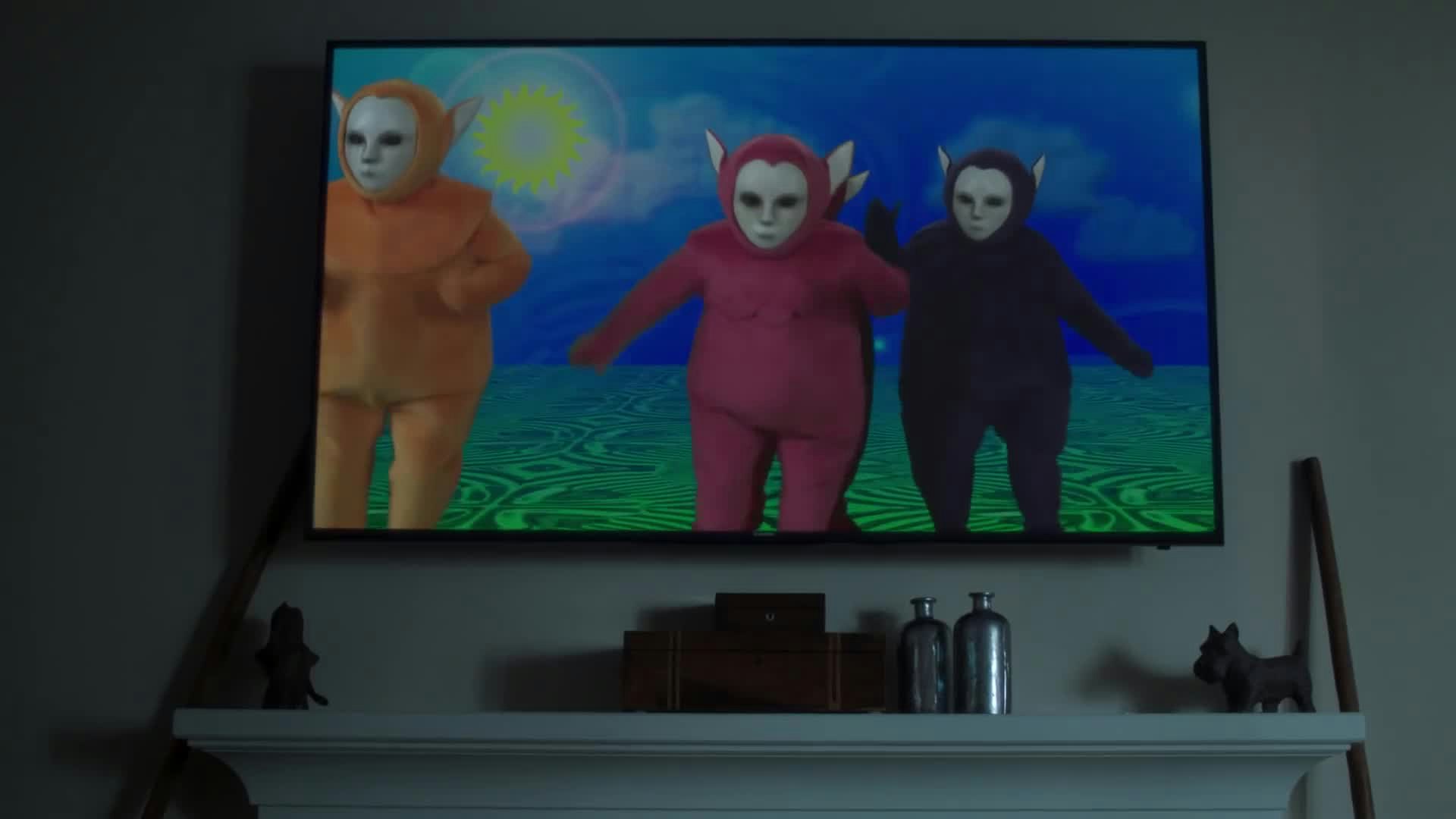
In the era of reboots, as every streamer and network strip-mines its properties in the hopes of translating nostalgia into big viewership, fans of The X-Files were mostly dealt disappointment. In 2016, a lackluster 10th season that made terrible creative choices aired to tepid reviews and disgruntled viewers. But for those who stuck around for 2018’s Season 11, there was a little bit of gold in the hills. Creator Chris Carter brought on fresh writing talent who keyed back into what originally made the show great, and they produced one of the season’s best episodes, “Familiar.”
In the opening, a boy named Andrew (Sebastian Billingsley-Rodriguez) spins on playground equipment, singing the theme song to a kids’ show called Mr. Chuckleteeth while clutching the terrifying doll, who looks like a mash-up of Slappy from Goosebumps and Slender Man. With his mother, Diana (Sharon Taylor), distracted by a phone call, Andrew spots a life-sized version of Mr. Chuckleteeth and follows him into the woods, only to be later found dead. His parents are left bereft, and Agents Mulder (David Duchovny) and Scully (Gillian Anderson) arrive to investigate.
The episode’s creative thrust came from two first-time X-Files talents. Directed with visual panache combining grisly imagery with mordant humor by Holly Dale, the script was provided by Benjamin Van Allen, who’d been a writer’s assistant on the previous season. Unlike much of that first reboot season, Dale and Van Allen ensured “Familiar” harkened back to the show’s monster-of-the-week episodes.
In a 2018 interview, Van Allen recalled wanting to make a classic episode that could stand alone. That meant no FBI office, no Skinner, and no overarching conspiracy, just good old-fashioned Mulder and Scully investigating the supernatural. The episode’s setting even reflects the show’s pilot. Like the forested Oregon town of Bellefleur, it’s the insularity of Eastwood, Connecticut, and the sins of its adults, where “Familiar” finds the roots of evil.
When the police suggest coywolves may be involved, Scully’s signature skepticism leads her to believe one of the parents is more likely the culprit, while Mulder’s more fanciful mind makes him suspect a hellhound. That’s not entirely out of left field; in 1658, Eastwood burned a woman for witchcraft.

When Scully reminds him that most murdered women were not, in fact, witches, Mulder retorts, “Just because there were bogus witch hunts, doesn’t mean there were no witches.” Scully’s response: “The only devil around here probably parks right here in front of the playground, stirring something other than his cauldron.” It’s that dark wit that was sorely missed from the previous season, which favored dramatic serial storytelling, rather than monster-of-the-week episodes that could afford to get a little cheeky.
Although the mechanics of “Familiar” are typical, with small clues and red herrings pacing our march to a final revelation, there’s also a fun “supernatural weirdness,” as Liz Shannon Miller put it in her Indiewire review, that the best MOTW episodes use to leave the audience quietly unsettled.
Here, the episode subverts surreal children’s television shows. Along with Mr. Chuckleteeth, there’s a Teletubbies-esque show called the Bibble-Tiggles, starring mono-colored velvet-clad dancing creatures with masked faces that mesmerize Emily (Emma Oliver), the daughter of the town’s police chief (Alex Carter). After she follows one of the Bibble-Tiggles into the woods and also meets her demise, mass hysteria culminates in further bloodshed. When Mulder and Scully finally piece together what’s really happening, it turns out they’re both right. An indiscretion between Chief Strong and Diana led to his wife Anna (Erin Chambers) unleashing ancient witchcraft she can’t control.

The episode asks us to contemplate the collateral damage of our most selfish choices, and the aftermath of the decisions we make in anger. In Notebook Column, writer Keith Uhlich noted, “Looking at the two barely-past-toddler-age casualties ... it’s hard not to think about the victims of the Sandy Hook or Parkland shootings, lambs to another kind of demonic slaughter.” Like the best X-Files episodes, the show uses small-town tensions to examine the current climate of American society.
There would only be one more monster-of-the-week episode, “Nothing Lasts Forever,” penned by another first-time writer, Karen Nielsen. It followed a literal cult of beauty and featured some of the most gruesome body horror ever aired on network television. Unfortunately, the series then ended on a thud, with a tedious finale written by creator Chris Carter that wraps up the abysmal arc of episodes surrounding Mulder and Scully’s son.
Although many of the series’ worst episodes are found in the reboot seasons, “Familiar” gave audiences a glimpse of what could have been if Carter had trusted his new writers more. Their love and understanding of what made The X-Files a phenomenon could have given Mulder and Scully more adventures worthy of them.







